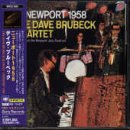Seminal work at a vintage concert
06/17/2000
(4 out of 5 stars)
"Brubeck's quartet had been in full swing for several years when they played this set at Newport. The band is tight, the sound is great, and everyone is swinging. Desmond's solo, especially his blues on "Things Ain't" have been considered some of his best. In fact, it was later transcribed by Luckey ... one of only 5 solos of that era that Luckey chose to transcribe to illustrate Desmond's style to future alto players. Sound is good in this recording to, having been remastered for this release."
Brubeck Live at Newport
MikeG | England | 06/20/2004
(4 out of 5 stars)
"Most new Brubeck fans probably come to his music via "Time Out" and similar `concept albums' (or via Greatest Hits compilations). But if the Brubeck Quartet is something more than a commercially successful purveyor of novelties it is because of the quality of Brubeck's and Desmond's jazz improvisation; and Brubeck's playing is generally at its best when he is improvising, usually before an audience, on the more conventional jazz material - popular songs, 12-bar blues and jazz standards (He rarely, in my opinion, improvised well on unusual time signatures). Brubeck's admiration for Duke Ellington as one of the greatest of jazz composer/musicians led him to dedicate his concert set at the 1958 Newport Jazz Festival to music by or associated with Ellington, as well as playing his own tribute composition, "The Duke". The quartet was in good form - not as inspired and original as in its early `50s concerts (Brubeck's improvising was becoming more conventional and formulaic), but Desmond solos with typical grace and fluency and Brubeck swings in a mainly direct, uncomplicated style. There's some sprightly soloing on the up-tempo "Perdido" and "C Jam Blues", a relaxed version of "Things Ain't What They Used To Be" and a typically `floating' solo from Desmond on the ballad, "Flamingo". My favourite track is "Dance Number 3" from Ellington's "Liberian Suite", which alternates between a tango-style rhythm and a more straight-ahead swing. The quartet's performance of this is a masterpiece of rhythmic and melodic invention, with that combination of spontaneity and sense of overall structure which marks their best work in the 1950s. Brubeck's solo has something of the quirky unpredictability and surprise of his earlier manner, especially at the point where he hits upon a dissonant chord and goes on to resolve it brilliantly. Joe Morello could sometimes be a horribly flashy, unsubtle drummer (throughout most of the Carnegie Hall concert, for example) but he could also play with taste and finesse (on the Gone With the Wind album, for example). On "Dance Number 3" his imaginative playing helps to shape and `carry' the performance with the kind of flair one finds in a good big-band drummer, and he is on generally good form throughout the concert. I do think the album is a bit of a missed opportunity: one can imagine how a more carefully thought out set with a better overall choice of material might have produced a deeper, more satisfying tribute to the Duke. It's odd, for example, that the only ballad number is one not penned by Ellington, when he composed some fine ones. Even so, `Dance Number 3' is on my personal list of Brubeck's best things."
Roger Sawyer's Review
R. Sawyer | Huddersfield, UK | 10/08/2007
(5 out of 5 stars)
"My first introduction to modern jazz was when I bought an EP record featuring two numbers from this concert. As a young drummer, I was particularly interested in Joe Morello's playing, which is excellent throughout, as is the whole quartet.
I subsequently bought the LP and have been trying to get hold of it on CD for some time now, but so far, without success.
I hope that it becomes available again on CD and helps to start a lifelong interest in jazz in another young person."


 Track Listings (7) - Disc #1
Track Listings (7) - Disc #1